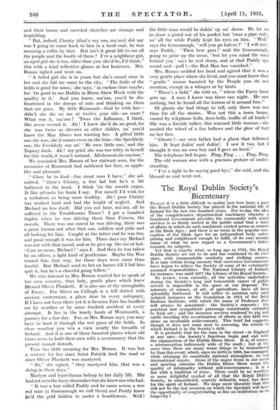The Royal Dublin Society's Bicentenary
TO-DAY it is a little difficult to realize just how large a part the Royal Dublin Society has played in the national life of Ireland for the last two hundred years. For to-day the idea of the comprehensive departmental machinery whereby a beneficent Government provides the community with social services is so firmly rooted in the public mind that a state of affairs in which no such machinery existed seems as remote as the Dark Ages ; and there is no room in the popular con- ception of the Dark Ages for an independent body enter- prising and enlightened enough to fulfil, of its own accord, many of what we now regard as a Government's duties towards its subjects.
Yet that is exactly what, so long ago. as 1731, the Royal Dublin Society set out to do and has continued to do ever since, with commendable assiduity and striking success. It is only within living memory that successive Governments have begun to relieve the Society of some of its voluntarily assumed responsibilities. The National Library of Ireland, for instance, was until 1877 the Library of the Royal Society.
To review, even cursorily, all the activities undertaken during the Society's long and honourable career of public service is impossible in the space at our disposal. The interests of science, of art, of agriculture, have all been splendidly furthered. It will suffice to mention only such isolated instances as the foundation in 1914 of the Irish Radium Institute, with which the name of Professor Joly will always be associated : the Society's concerts ; the practical and sympathetic patronage consistently extended to Irish art ; and the immense services rendered to pig and cattle breeding (the co-ordination of efforts in this field was alone an invaluable achievement). This brief list suggests, though it does not come near to assessing, the extent to which Ireland is in the Society's debt. It is probable that for the man in the street—in England at any rate—the Society's functions begin and end with the organization of the Dublin Horse Show. It is, of course, a misconception ludicrously wide of the mark ; but at the same time there are many worse things to be remembered by than this event, which, since its birth in 1868, has managed, while retaining its essentially national atmosphere, to Win international repute. Alone of the major items in our social and sporting calendar the Dublin Horse Show wears the quality of informality without self-consciousness ; it is a fair with a tradition of tenue. There could be no worthier or more delightful symbol of all that the Royal Dublin Society, in unnumbered, scarcely definable, ways, has done for the spirit of Ireland. We hope most tincerely that this will not be the last occasion on which the Spectator will have the opportunity of congratulating so fine an institution on its longevity 1










































 Previous page
Previous page